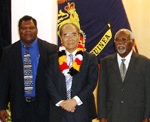The Director-General visits Papua New Guinea

- © UNESCO/A. Vohra
From 20 to 22 February, the Director-General of UNESCO, Mr Koïchiro Matsuura, paid his first official visit to Papua New Guinea, marking the beginning of his fourth trip to the Pacific Nations where he is expected to visit eight Small Island States.
During his stay in Port Moresby, Mr Matsuura held bilateral talks with Senior Government Officials, including: Sir Paulias Matane, Governor-General; Dr Puka Temu, Deputy Prime Minister; Mr Michael Ogio, Minister for Higher Education, Research and Technology; Mr Charles Abel, Minister of Culture and Tourism; Dame Carol Kidu, Minister of Community Development; and Mr David Arore, Vice-Minister of Education – all of whom expressed their deepest appreciation for the Director-General’s visit, which they said demonstrates his commitment to further enhancing developmental cooperation between UNESCO and the Pacific Island States. They also requested UNESCO’s continued assistance to address the challenges faced by the country in the areas of literacy as well as vocational and technical education.
In his various discussions, Mr Matsuura noted with appreciation that Papua New Guinea recognized education as vital to national development. However, he said that the questions of access to education as well as quality education were yet to be successfully addressed. Referring to UNESCO’s ongoing cooperation with Papua New Guinea within the Literacy Initiative for Empowerment (LIFE), the Director-General said that with only 57% adult literacy, Papua New Guinea was at serious risk of not achieving the Education for All (EFA) target by 2015. Noting the Government’s increased political commitment and firm structure to accelerate literacy efforts, in line with the UNESCO National Education Support Strategy (UNESS), the Director-General announced his intention to strengthen the Organization’s cooperation with, and assistance to, Papua New Guinea in literacy and teacher training through extrabudgetary funding to be implemented in cooperation with the UNESCO Apia Office.
In the area of culture, Mr Matsuura recognized Papua New Guinea’s rich cultural diversity and expressed his hope that the Kuk Early Agricultural site would shortly be inscribed on the World Heritage List. Referring to UNESCO’s lead role in the International Year of Languages and particularly to Papua New Guinea’s rich linguistic diversity (Papua New Guinea has more languages than any other country, with over 820 indigenous languages representing 12% of the world’s total), he strongly encouraged the Government to ratify the Convention on the Safeguarding of the Intangible Cultural Heritage in order to benefit from the Organization’s technical expertise and financial assistance in the preservation of intangible heritage, including oral cultural traditions. In this regard, Mr Matsuura affirmed UNESCO’s readiness to fully assist the Government through the UNESCO Apia Office with the organization of a national workshop that will aim to provide training on the preparation of nomination files.
The Director-General also met with members of the Papua New Guinea National Commission to UNESCO to discuss areas of further cooperation. Mr Matsuura welcomed the Government’s commitment to allocate a considerable amount of funding to the National Commission in recognition for its work. He also applauded the Government’s initiative to grant the Commission, which was previously under the Ministry of Education, with an autonomous status to be located in a separate building complex, thereby showing greater support and importance to its works.
Mr Matsuura met with members of the UN Country Team (UNCT), who informed him of the various programmes currently implemented in Papua New Guinea, and the challenges it faces to meet the needs of the country. The Director-General expressed his satisfaction with the progress made by the UNCT, especially in the context of the ‘delivering as one’ programme and announced his intention to establish a UNESCO national presence in the form of an antenna of the UNESCO Apia Office in Papua New Guinea, which would also be part of the UNCT.
The Government hosted an official lunch and dinner for Senior Official dignitaries including the Minister of Culture and Tourism, the Minister of Community Development and foreign diplomats such as the Ambassadors of France and the USA to Papua New Guinea.
During his stay, the Director-General visited the Curriculum Development and Assessment Media Centre, responsible for curriculum and assessment in all schools within the National Education System from Elementary level to Grade 12. He also visited the National Museum and Art Gallery, which houses the cultural materials of over 800 different language groups that exist in Papua New Guinea, as well as the country’s most important cultural objects in terms of religious significance.
- Author(s):Office of the Spokeswoman
- Source:Flash Info N° 022-2008
- 22-02-2008

